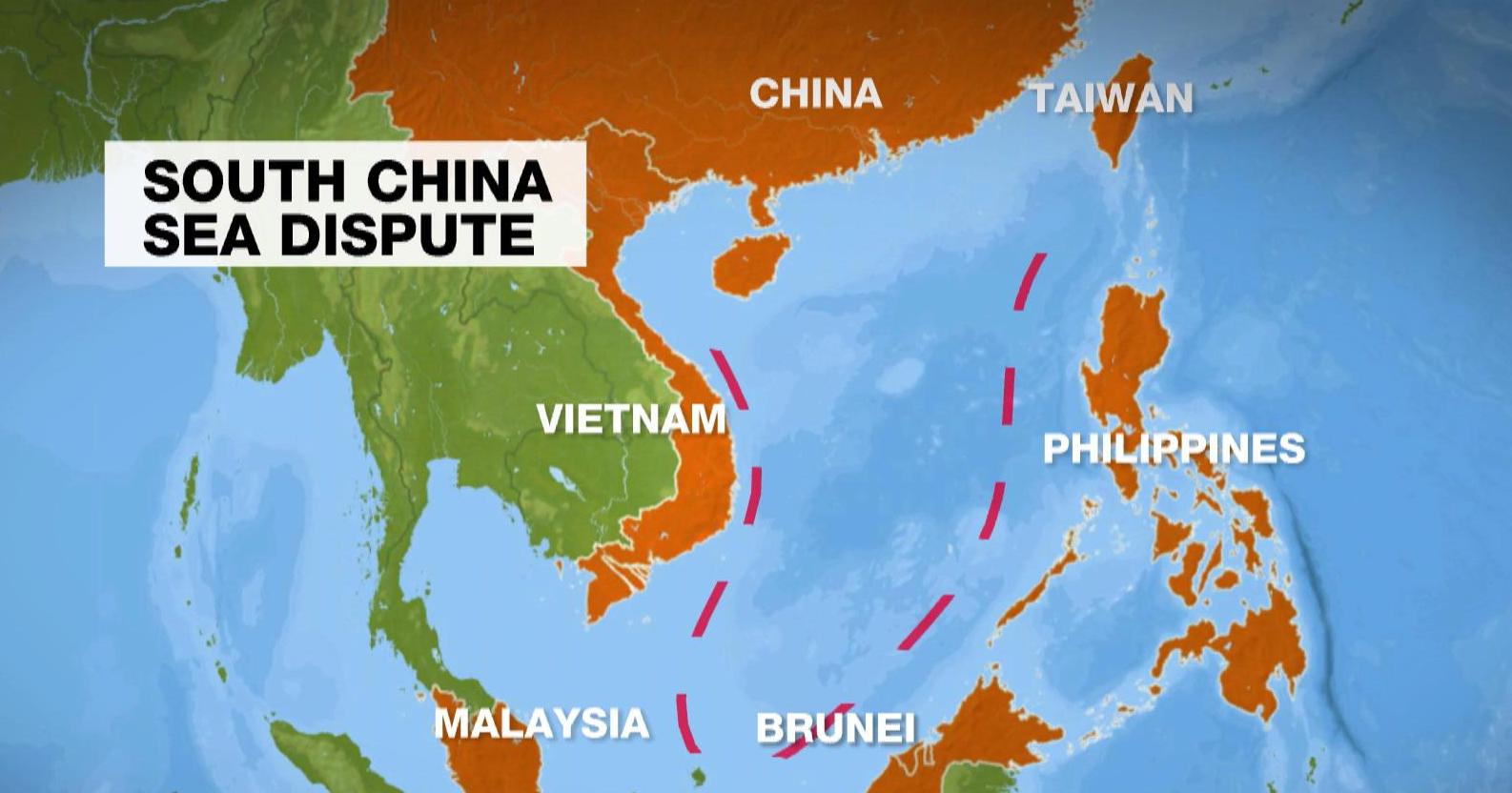
The United States Navy Destroyer –USS Dewey (DDG 105) sailed within 12 nautical miles of the Mischief Reef in Nansha Islands (Spratly Islands) on 24 May 2017, conducting what is commonly known as a Freedom of Navigation Operation (FONOP). In addition to domestic factors within the United States, this action of the USS Dewey was motivated by the desire to promote an international conception that the Mischief Reef is not an island, to avoid objectively acknowledging China's sovereignty over the Mischief Reef, to challenge China's sovereignty claims over the South China Sea, and to protect the United States Navy's vital interests, among others. These justifications bring into question whether the USS Dewey was truly making an “innocent passage.”
This is the first time an FONOP has been conducted since President Donald Trump took office; a contrast to recent events in which China and the United States have gradually warmed ties and taken steps toward bilateral collaboration. The tension inspiring FONOPs are slated to continue; Defence Secretary James Mattis confirmed this during the Shangri-La Dialogue held in Singapore on June 5, 2017. The following month, another FONOP was conducted within 12 nautical miles of the Zhongjian (Triton) Island in Xisha (Paracel) Islands on July 2, 2017. Should they continue, FONOPs may also be further upgraded to “harmful passage.” What then should China do: continue on the current approach, introduce a comprehensive response after careful calculation, or perhaps even take out the “big stick” of military might out when necessary?
An Analysis of China's South China Sea Stand
How should China deal with the South China Sea (SCS) issue? Its response mainly depends on how China views the SCS: As internal waters? As territorial sea? As territorial sea plus Exclusive Economic Zones? Territorial Waters plus Exclusive Economic Zones (including Continental Shelf) plus High Sea? Archipelagic Waters? High Sea?
China states that it, “has indisputable sovereignty over the South China Sea islands and their adjacent waters, as well as sovereign rights and jurisdiction over relevant seabed and subsoil,"[1] According to this statement, China has indisputable sovereignty over the South China Sea Islands (the Dongsha Islands, the Xisha Islands, the Zhongsha Islands and the Nansha Islands) and the adjacent waters." In another statement, China claimed, "China’s sovereignty over Nanhai Zhudao and relevant rights and interests in the South China Sea have been established in the long course of history, and are solidly grounded in history and law."[2]
China therefore deems that there are no disputes over the island and reef ownerships and maritime rights in the Xisha Islands (Paracel Islands) and Zhongsha Islands, but admits there are disputes of such over the Nansha Islands (the Spratly Islands).
Maritime delimitation can only be carried out after determining the ownerships of islands and reefs. And so far, the Chinese mainland, China’s Taiwan, Vietnam, Malaysia, and the Philippines have all taken control of some of the islands and reefs in the South China Sea. As many have professed, splitting the difference is the only way to a peaceful solution to the South China Sea issue. However, this is extremely difficult as it requires one or more of the claimants to cede their control over their islands and reefs.
The Dispute of the South China Sea Issue and China's Rise
China should consider the long-term consequences of war and carefully evaluate its necessity. The key to grasping the South China Sea issue is to acknowledge that it is a strategic issue first, a political issue second, and a legitimacy issue last. When dealing with SCS issue, China should go far beyond SCS. In other words, China should not only consider how to maximise its own interests in SCS, but how to advance China's rise as a comprehensive global power. This means that China must consider the South China Sea issue with a comprehensively, seriously contemplating the following questions:
1. Which is more important, the building of OBOR or the disputes over SCS?
OBOR is a top-level priority of foreign relations designed in a collaboration of the current Chinese government and long-term strategic planning. In this sense, the politics, diplomatic responses, and the legal instruments and so forth employed in resolving the South China Sea issue should all be serving OBOR. For the time being, SCS issue is in a relatively peaceful period. However, it is nonetheless a major concern to the regional security and stability, is a tool in the United States' "regional re-balancing strategy," and also affects the implementation of OBOR (especially the Maritime Silk Road) in the ASEAN countries, particularly the ASEAN claimants. For this reason, China's South China Sea policy should steer from pursuing a unilateral win to a multilateral win, and should attempt to bring forth a multilateral winning plan by taking the lead in the problem solving process. The next few years are a good window of time for China to establish a new South China Sea policy.
2. How can a balance be struck between building a regional strategic support belt and safeguarding the sovereignty and maritime rights of SCS?
It is not rare to find that the rise of a country causes security concerns to increase among its neighboring countries. In this process, gaining their favor is a necessary task. In order to achieve this, the rising country has to lessen its neighboring countries' security concerns and build up their trust. Whilst China's exercise in self-restraint is largely overlooked, the outside world is mainly focused on China's moves in safeguarding its rights, and tends to describe these moves as "assertive." To "force China to clarify its SCS claim" has already become one of the priorities of the United States' SCS strategy, and this has won numerous supports from a number of ASEAN countries.
As China is the largest coastal country along SCS, the other claimants are no match for China’s capacity to resolve the South China Sea issue by force. If China could facilitate a multilateral winning plan that not only satisfies its own interests, but also takes into consideration those of the other claimants' concerns, then the security concerns of ASEAN countries, especially the ASEAN claimants will be much decreased and should consequently lessen their security reliance on other countries outside the region. This could also cause other neighboring countries to increase their trust in China.
3. How can the government consider both its global maritime interests and its interests in the South China Sea?
Overseas interest is quickly expanding, maritime interest is rapidly increasing, and a great “blue water navy” is in the making. But China's rise to a becoming a global power cannot be completed without the support of its maritime rights and interests. China's maritime claims should maximise its interests not only in coastal waters but also in global waters. Hence, China's maritime claims have to be universally applicable, so as to make China one of the main builders and leaders of the global maritime management regime and to provide the country with space to successfully maximise its maritime interests in global waters.
4. How is it possible to coordinate the maritime claims of the East China Sea, the South China Sea and the Yellow Sea, and use the South China Sea issue to support to the settlement of the Taiwan?
At present, China's maritime claims have not been made clear enough to the world. In regard to the Yellow Sea, China stresses international law, especially the equity principle. In the East China Sea, China continues its advocacy of UCLOS and places emphasis on the principle of natural extension of the continental shelf. In respect to SCS, China focuses on the application of both international law and historical rights of ownership.
A more realistic approach should guide the direction of China's new maritime policy: have the Yellow Sea claim based on the adjusted medium line, the East China Sea claim based on the combination of the medium line and the continental shelf, and the South China Sea claim based on international law and a clarified historic rights claim.
For China, the Taiwan question is undoubtedly more important than SCS issue, the East China Sea issue or the DPRK nuclear issue. But seeing as not much can be done in the case of the East China Sea or the DPRK nuclear problem the South China Sea becomes the primary option to act and its urgency becomes increasingly clear. Taking into account the intervention of the outside countries, especially the United States and Japan, on SCS issue, and Tsai Ing-wen's deep-rooted preference for "Taiwan’s independence," in regard to the SCS issue, China should consider how to 'pull' the ASEAN countries close in order to prevent the East China Sea issue from becoming linked with SCS issue and not to “add a burden” to Taiwan discussion.
5. What role does South China Sea issue in the China-ASEAN relations?
In dealing with the South China Sea issue, the ASEAN countries, in particular the ASEAN claimants, are more focused on "controlling differences" whilst China is more concerned about "strengthening cooperation." To this end, both China and the ASEAN claimants have called for the creation of the “SCS Code of Conduct” (COC) as soon as possible. China, while deeming the settlement of SCS issue a long-term process and believing the COC unable to eliminate the dispute, introduced the "dual-track approach" and agreed to relatively speed up the drafting of COC framework. As a result, a framework document of COC was finally signed by China and the ASEAN countries on May 18, 2017. Remaining issues such as whether COC is legally binding, which maritime areas are applicable, whether a dispute settlement mechanism should be established and so forth are still left for further discussion.
If there is no breakthrough in the issues of the most concern to the relevant countries, the effectiveness of COC will be significantly affected. Further unilateral actions may also be a possibility, depending on China’s capacities. In that case, the ASEAN countries are highly likely to strengthen security cooperation with outside countries especially the United States, a move that will then affect their economic and security cooperation with China. It is in this thinking that China must consider the option of entering a legally binding multilateral framework and promote the idea solving process of SCS issue within this framework.
As a rising great power, China should examine SCS issue from a global standpoint, so as to bring forward a new SCS policy that serves the primary objective of China’s ascent as a comprehensive global power. With this new policy, China should be more mindful when dealing with SCS issue. To the ASEAN countries, China could be more flexible gaining their interests and trusts, as well as lessen their security concerns while to the United States’ FONOPs, China should dare to confront them.
At the very least, from October 27, 2015 when the United States Navy Destroyer, USS Lassen sailed within 12 nautical miles of the Subi Reef in Nansha Islands, the United States’ FONOPs have been a primary source of periodical tension in the South China Sea. China's response should be to send a warship to "identify and verify, warn and expel," which is exactly what occurred with the USS Dewey. This is obviously far from enough, and could very well result in the United States taking a yard when given an inch. In dealing with so-called FONOPs within 12 nautical miles, China must show its determination and clearly demonstrate to the United States that: this act is definitely a violation to the Chinese laws and a humiliation to a rising power. A mature superpower should not behave that way.
-----------------------------------------
[1] See the notes submitted by China to the Secretary General of the United Nations on May 7 2009 and April 14 2011, file number CML/17/2009 and CML/8/2011, respectively.
[2] See the Position Paper of the Government of the People's Republic of China on the Matter of Jurisdiction in the South China Sea Arbitration Initiated by the Republic of the Philippines published on December 7, 2014.




